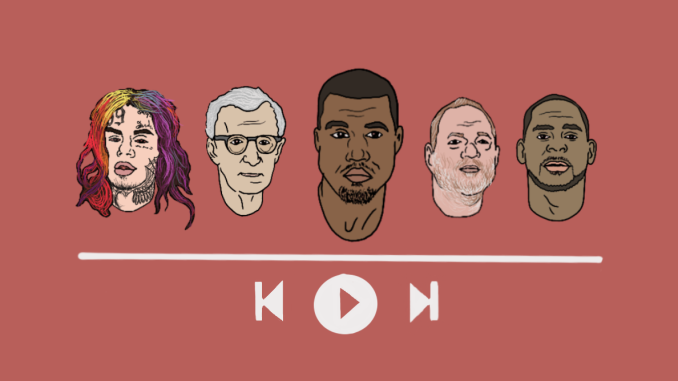
On Oct. 21, Balenciaga ended its relationship with famous singer, rapper and designer Ye, formerly known as Kanye West, after he posted a series of antisemitic comments and threats on social media targeting his ex-wife Kim Kardashian. Despite West’s many hits, including the albums like Donda, The Life of Pablo and Graduation, he’s been a controversial star for years.
In 2009, he stormed the stage of the MTV Video Music Awards and interrupted Taylor Swift’s speech after winning Best Female Video for “You Belong With Me” and years later took credit for her fame in his song Famous. In 2016, he publicly supported Bill Cosby and in 2018, he said slavery was a “choice” in a TMZ interview.
He’s recently spewed violent antisemitic hate, including a threatening now-deleted tweet from Oct. 8 and praised Hitler in an interview with alt-right conspiracy theorist Alex Jones on his show, InfoWars.
Despite the blatant bigotry surrounding West’s work, people continue to support his music by claiming they’re separating the art from the artist. However, students must recognize that it’s irresponsible and impossible because art is a direct reflection of an artist. They should choose to either mute the artist or at least acknowledge they are supporting dangerous ideologies by consuming their work.
Art is not just producing sneakers or making flyers for people; an artist’s art is who they are, said Mark Leuchter, a religion professor.
“If you have people that are paying attention to your art and giving it a place in their lives and letting it affect their mind and letting it affect their emotions, then you, as an artist, are affecting their minds and their emotions.”
West’s biases can be heard in misogynistic and antisemitic lyrics, like, “I’m tight with my dough like my family Jews, uh! I said ‘Jews’ my career is screwed,” from his “Rock the Mic Freestyle” in 2005. When prejudices are not explicitly heard in his music, West still has social influence as a popular celebrity and his antisemitic ideas are inspiring others to carry out hateful actions.
On Dec. 14, a man made antisemitic comments toward a 63-year-old man in New York City and said “Kanye 2024” before assaulting the bystander, NBC News reported. On Oct. 22, an antisemitic hate group hung a banner reading “Kanye is right about the Jews” over a freeway in Los Angeles.
When an artist gains followers and says hateful things, they’re likely to influence others, said Guillermo Caliendo, a communication and social influence professor.
“If a cultural artifact is creating a society that becomes violent, aggressive and actually not tolerant of anything except for what they like, then we have a major problem on our hands,” Caliendo said.
Students should stop giving platforms to artists, like West, who incite hate and violence. If they continue consuming their content, students must determine whether their own enjoyment is worth contributing to another’s pain.
When problematic figures aren’t influencing society directly, they still may be harming people within their industries, like their peers or fans, through dangerous behaviors, like abuse or spreading hateful ideals. Trying to separate people from their work condones that an artist’s final product is worth the harm that went into it.
“Celebrities are literally built off of their fans, like they don’t get money unless they’re liked and appreciated,” said Victoria Mezher, a junior psychology major. “So if we stopped that altogether, we could actually make a change and show him that what he’s doing is wrong.”
For example, Harvey Weinstein, a former filmmaker, is serving a 23-year prison sentence after being convicted of rape and sexual assault. The Weinstein Company has released a variety of movies, like Django Unchained, Kill Bill volume 1 and Silver Linings Playbook, and many are still popular.
When people support Weinstein’s films, they support a man who has committed acts of sexual violence. Weinstein is incarcerated, but others in the industry who have been accused of sexual abuse, like recently retired Woody Allen, can still profit from their work as viewers continuously watch their films.
Following West’s decision to use his platforms to spread hateful messages, it’s important to recognize the harm problematic celebrities can cause. Ending support for West and others might be difficult for some, but it’s important to understand that choosing to support them can further build their platform. Being vocal about following an artist can demonstrate a disregard for the damage they create.
“If people are paying attention to you and consuming it, and therefore creating a demand for it, they’re creating space for the artist,” Leuchter said. “If you can’t separate the art from the artist, then you’re essentially saying, ‘You know, this person did something really terrible, but I don’t care.’”
Students need to recognize that it’s impossible to separate art from the artist; they must either no longer support an artist or acknowledge they are enabling harmful ideologies by defending them.
Without separating the art from the artist, it allows those with power to continue to abuse their popularity and condone hate speech and actions.


Be the first to comment